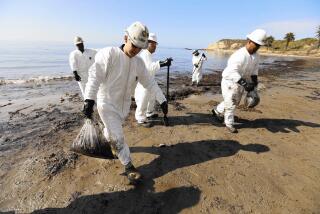Yost Calls Exxon’s Revised Cleanup Plan ‘Very Thin’
- Share via
VALDEZ, Alaska — U.S. Coast Guard Commandant Paul A. Yost today faulted Exxon’s revised plan to clean up the nation’s largest oil spill as “very thin” but promised the effort will be completed this summer.
“The plan is very thin. There’s not a lot of backup or substantiation,” said Yost, an admiral chosen by President Bush to track the cleanup effort for the federal government.
“We are going to be done this summer,” Yost said at a news briefing after arriving for a weeklong tour. “Some beaches are going to be sparkling, some beaches are going to be far from sparkling.”
Yost’s comments followed the release late Monday of Exxon’s revised strategy to clean up the oil spilled by the tanker Exxon Valdez.
Exxon wants to burn or bury the sludge recovered, and said environmental laws may have to be bypassed to allow the disposal. The plan, submitted only hours before a deadline, requires Yost’s approval before it is put into effect. He said he will make that decision within a week.
Exxon Efforts Assailed
Exxon’s proposal immediately drew the scrutiny of Alaskan environmental officials, who contend that Exxon failed to act quickly to clean up the more than 10 million gallons of oil spilled when the tanker hit a reef March 24 in Prince William Sound.
The plan estimates that poor weather and logistical problems will force a slowdown in the cleanup through September, cutting by 50% the number of days the crews can actually spend on the beaches and water.
Exxon’s two-part strategy on cleanup and disposal makes no provisions for continuing the operation beyond mid-September.
“It’s our objective and we’re convinced . . . with the plan that we currently have that we’ll get the major part of this spill cleaned up by the middle of September, 1989,” Lawrence Rawl, chairman and chief executive officer of Exxon, said in an interview on “CBS This Morning.”
The plan also notes that 191 miles of moderately fouled coastline may be left untouched to be cleansed naturally by the environment.
More to Read
Sign up for Essential California
The most important California stories and recommendations in your inbox every morning.
You may occasionally receive promotional content from the Los Angeles Times.











